#greenwashing
Text
Greenwashing set Canada on fire
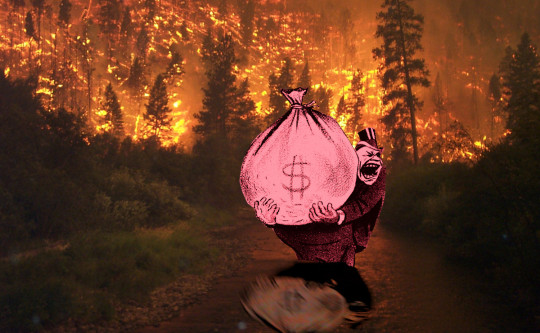
On September 22, I'm (virtually) presenting at the DIG Festival in Modena, Italy. On September 27, I'll be at Chevalier's Books in Los Angeles with Brian Merchant for a joint launch for my new book The Internet Con and his new book, Blood in the Machine.

As a teenager growing up in Ontario, I always envied the kids who spent their summers tree planting; they'd come back from the bush in September, insect-chewed and leathery, with new muscle, incredible stories, thousands of dollars, and a glow imparted by the knowledge that they'd made a new forest with their own blistered hands.
I was too unathletic to follow them into the bush, but I spent my summers doing my bit, ringing doorbells for Greenpeace to get my neighbours fired up about the Canadian pulp-and-paper industry, which wasn't merely clear-cutting our old-growth forests – it was also poisoning the Great Lakes system with PCBs, threatening us all.
At the time, I thought of tree-planting as a small victory – sure, our homegrown, rapacious, extractive industry was able to pollute with impunity, but at least the government had reined them in on forests, forcing them to pay my pals to spend their summers replacing the forests they'd fed into their mills.
I was wrong. Last summer's Canadian wildfires blanketed the whole east coast and midwest in choking smoke as millions of trees burned and millions of tons of CO2 were sent into the atmosphere. Those wildfires weren't just an effect of the climate emergency: they were made far worse by all those trees planted by my pals in the eighties and nineties.
Writing in the New York Times, novelist Claire Cameron describes her own teen years working in the bush, planting row after row of black spruces, precisely spaced at six-foot intervals:
https://www.nytimes.com/2023/09/15/opinion/wildfires-treeplanting-timebomb.html
Cameron's summer job was funded by the logging industry, whose self-pegulated, self-assigned "penalty" for clearcutting diverse forests of spruce, pine and aspen was to pay teenagers to create a tree farm, at nine cents per sapling (minus camp costs).
Black spruces are made to burn, filled with flammable sap and equipped with resin-filled cones that rely on fire, only opening and dropping seeds when they're heated. They're so flammable that firefighters call them "gas on a stick."
Cameron and her friends planted under brutal conditions: working long hours in blowlamp heat and dripping wet bulb humidity, amidst clouds of stinging insects, fingers blistered and muscles aching. But when they hit rock bottom and were ready to quit, they'd encourage one another with a rallying cry: "Let's go make a forest!"
Planting neat rows of black spruces was great for the logging industry: the even spacing guaranteed that when the trees matured, they could be easily reaped, with ample space between each near-identical tree for massive shears to operate. But that same monocropped, evenly spaced "forest" was also optimized to burn.
It burned.
The climate emergency's frequent droughts turn black spruces into "something closer to a blowtorch." The "pines in lines" approach to reforesting was an act of sabotage, not remediation. Black spruces are thirsty, and they absorb the water that moss needs to thrive, producing "kindling in the place of fire retardant."
Cameron's column concludes with this heartbreaking line: "Now when I think of that summer, I don’t think that I was planting trees at all. I was planting thousands of blowtorches a day."
The logging industry committed a triple crime. First, they stole our old-growth forests. Next, they (literally) planted a time-bomb across Ontario's north. Finally, they stole the idealism of people who genuinely cared about the environment. They taught a generation that resistance is futile, that anything you do to make a better future is a scam, and you're a sucker for falling for it. They planted nihilism with every tree.
That scam never ended. Today, we're sold carbon offsets, a modern Papal indulgence. We are told that if we pay the finance sector, they can absolve us for our climate sins. Carbon offsets are a scam, a market for lemons. The "offset" you buy might be a generated by a fake charity like the Nature Conservancy, who use well-intentioned donations to buy up wildlife reserves that can't be logged, which are then converted into carbon credits by promising not to log them:
https://pluralistic.net/2020/12/12/fairy-use-tale/#greenwashing
The credit-card company that promises to plant trees every time you use your card? They combine false promises, deceptive advertising, and legal threats against critics to convince you that you're saving the planet by shopping:
https://pluralistic.net/2021/11/17/do-well-do-good-do-nothing/#greenwashing
The carbon offset world is full of scams. The carbon offset that made the thing you bought into a "net zero" product? It might be a forest that already burned:
https://pluralistic.net/2022/03/11/a-market-for-flaming-lemons/#money-for-nothing
The only reason we have carbon offsets is that market cultists have spent forty years convincing us that actual regulation is impossible. In the neoliberal learned helplessness mind-palace, there's no way to simply say, "You may not log old-growth forests." Rather, we have to say, "We will 'align your incentives' by making you replace those forests."
The Climate Ad Project's "Murder Offsets" video deftly punctures this bubble. In it, a detective points his finger at the man who committed the locked-room murder in the isolated mansion. The murderer cheerfully admits that he did it, but produces a "murder offset," which allowed him to pay someone else not to commit a murder, using market-based price-discovery mechanisms to put a dollar-figure on the true worth of a murder, which he duly paid, making his kill absolutely fine:
https://pluralistic.net/2021/04/14/for-sale-green-indulgences/#killer-analogy
What's the alternative to murder offsets/carbon credits? We could ask our expert regulators to decide which carbon intensive activities are necessary and which ones aren't, and ban the unnecessary ones. We could ask those regulators to devise remediation programs that actually work. After all, there are plenty of forests that have already been clearcut, plenty that have burned. It would be nice to know how we can plant new forests there that aren't "thousands of blowtorches."
If that sounds implausible to you, then you've gotten trapped in the neoliberal mind-palace.
The term "regulatory capture" was popularized by far-right Chicago School economists who were promoting "public choice theory." In their telling, regulatory capture is inevitable, because companies will spend whatever it takes to get the government to pass laws making what they do legal, and making competing with them into a crime:
https://pluralistic.net/2022/06/13/public-choice/#ajit-pai-still-terrible
This is true, as far as it goes. Capitalists hate capitalism, and if an "entrepreneur" can make it illegal to compete with him, he will. But while this is a reasonable starting-point, the place that Public Choice Theory weirdos get to next is bonkers. They say that since corporations will always seek to capture their regulators, we should abolish regulators.
They say that it's impossible for good regulations to exist, and therefore the only regulation that is even possible is to let businesses do whatever they want and wait for the invisible hand to sweep away the bad companies. Rather than creating hand-washing rules for restaurant kitchens, we should let restaurateurs decide whether it's economically rational to make us shit ourselves to death. The ones that choose poorly will get bad online reviews and people will "vote with their dollars" for the good restaurants.
And if the online review site decides to sell "reputation management" to restaurants that get bad reviews? Well, soon the public will learn that the review site can't be trusted and they'll take their business elsewhere. No regulation needed! Unleash the innovators! Set the job-creators free!
This is the Ur-nihilism from which all the other nihilism springs. It contends that the regulations we have – the ones that keep our buildings from falling down on our heads, that keep our groceries from poisoning us, that keep our cars from exploding on impact – are either illusory, or perhaps the forgotten art of a lost civilization. Making good regulations is like embalming Pharaohs, something the ancients practiced in mist-shrouded, unrecoverable antiquity – and that may not have happened at all.
Regulation is corruptible, but it need not be corrupt. Regulation, like science, is a process of neutrally adjudicated, adversarial peer-review. In a robust regulatory process, multiple parties respond to a fact-intensive question – "what alloys and other properties make a reinforced steel joist structurally sound?" – with a mix of robust evidence and self-serving bullshit and then proceed to sort the two by pantsing each other, pointing out one another's lies.
The regulator, an independent expert with no conflicts of interest, sorts through the claims and counterclaims and makes a rule, showing their workings and leaving the door open to revisiting the rule based on new evidence or challenges to the evidence presented.
But when an industry becomes concentrated, it becomes unregulatable. 100 small and medium-sized companies will squabble. They'll struggle to come up with a common lie. There will always be defectors in their midst. Their conduct will be legible to external experts, who will be able to spot the self-serving BS.
But let that industry dwindle to a handful of giant companies, let them shrink to a number that will fit around a boardroom table, and they will sit down at a table and agree on a cozy arrangement that fucks us all over to their benefit. They will become so inbred that the only people who understand how they work will be their own insiders, and so top regulators will be drawn from their own number and be hopelessly conflicted.
When the corporate sector takes over, regulatory capture is inevitable. But corporate takeover isn't inevitable. We can – and have, and will again – fight corporate power, with antitrust law, with unions, and with consumer rights groups. Knowing things is possible. It simply requires that we keep the entities that profit by our confusion poor and thus weak.
The thing is, corporations don't always lie about regulations. Take the fight over working encryption, which – once again – the UK government is trying to ban:
https://www.theguardian.com/technology/2023/feb/24/signal-app-warns-it-will-quit-uk-if-law-weakens-end-to-end-encryption
Advocates for criminalising working encryption insist that the claims that this is impossible are the same kind of self-serving nonsense as claims that banning clearcutting of old-growth forests is impossible:
https://twitter.com/JimBethell/status/1699339739042599276
They say that when technologists say, "We can't make an encryption system that keeps bad guys out but lets good guys in," that they are being lazy and unimaginative. "I have faith in you geeks," they said. "Go nerd harder! You'll figure it out."
Google and Apple and Meta say that selectively breakable encryption is impossible. But they also claim that a bunch of eminently possible things are impossible. Apple claims that it's impossible to have a secure device where you get to decide which software you want to use and where publishers aren't deprive of 30 cents on every dollar you spend. Google says it's impossible to search the web without being comprehensively, nonconsensually spied upon from asshole to appetite. Meta insists that it's impossible to have digital social relationship without having your friendships surveilled and commodified.
While they're not lying about encryption, they are lying about these other things, and sorting out the lies from the truth is the job of regulators, but that job is nearly impossible thanks to the fact that everyone who runs a large online service tells the same lies – and the regulators themselves are alumni of the industry's upper eschelons.
Logging companies know a lot about forests. When we ask, "What is the best way to remediate our forests," the companies may well have useful things to say. But those useful things will be mixed with actively harmful lies. The carefully cultivated incompetence of our regulators means that they can't tell the difference.
Conspiratorialism is characterized as a problem of what people believe, but the true roots of conspiracy belief isn't what we believe, it's how we decide what to believe. It's not beliefs, it's epistemology.
Because most of us aren't qualified to sort good reforesting programs from bad ones. And even if we are, we're probably not also well-versed enough in cryptography to sort credible claims about encryption from wishful thinking. And even if we're capable of making that determination, we're not experts in food hygiene or structural engineering.
Daily life in the 21st century means resolving a thousand life-or-death technical questions every day. Our regulators – corrupted by literally out-of-control corporations – are no longer reliable sources of ground truth on these questions. The resulting epistemological chaos is a cancer that gnaws away at our resolve to do anything about it. It is a festering pool where nihilism outbreaks are incubated.
The liberal response to conspiratorialism is mockery. In her new book Doppelganger, Naomi Klein tells of how right-wing surveillance fearmongering about QR-code "vaccine passports" was dismissed with a glib, "Wait until they hear about cellphones!"
https://pluralistic.net/2023/09/05/not-that-naomi/#if-the-naomi-be-klein-youre-doing-just-fine
But as Klein points out, it's not good that our cellphones invade our privacy in the way that right-wing conspiracists thought that vaccine passports might. The nihilism of liberalism – which insists that things can't be changed except through market "solutions" – leads us to despair.
By contrast, leftism – a muscular belief in democratic, publicly run planning and action – offers a tonic to nihilism. We don't have to let logging companies decide whether a forest can be cut, or what should be planted when it is. We can have nice things. The art of finding out what's true or prudent didn't die with the Reagan Revolution (or the discount Canadian version, the Mulroney Malaise). The truth is knowable. Doing stuff is possible. Things don't have to be on fire.



If you'd like an essay-formatted version of this post to read or share, here's a link to it on pluralistic.net, my surveillance-free, ad-free, tracker-free blog:
https://pluralistic.net/2023/09/16/murder-offsets/#pulped-and-papered
#pluralistic#logging#pulp and paper#ontario#greenwashing#a market for lemons#incentives matter#capitalism#late-stage capitalism#climate emergency#wildfires#canada#canpoli#ontpoli#carbon offsets#self-regulation#nerd harder#epistemological chaos#regulatory capture#Claire Cameron#pines in lines
3K notes
·
View notes
Text
Whenever an existing faux product is described as "vegan product" my hackles raise.
It's not vegan leather, it's pleather.
It's not vegan butter, it's margarine.
It's not vegan cashmere, it's acrylic.
It's not vegan fur, it's faux fur. Also probably an acrylic or rayon blend.
It's not vegan silk, it's polyester.
We haven't gotten to calling vegetable shortening "vegan lard" yet, but given the butter situation...
Call a spade a spade and stop greenwashing! Just admit it's plastic! Just admit you've prioritized one kind of animal life over the other! Stop calling it vegan when it's just plastic, you're driving people to destroy the planet with the "more moral" option when it's NOT.
You can enjoy margarine, that's fine, just be up front about it being in the dish so people know what they're eating by a familiar name.
#if you want to be vegan then just don't get leather or fur#don't get the plastic substitute either. just avoid the style#commit or don't but just stop trying to hide your synthetics consumption#plastic#greenwashing#Phoenix Talks#vent post
731 notes
·
View notes
Text
Israel pink washing this, israel brown washing that,
Okay but have you considered that you might be reverse colour washing Israel?
Random Jews and Israeli's online speaking about their queer experiences is not pink washing. Pink washing cannot be done at the indivdual level. Claiming that queer Jews and Israeli's are pink washing is reverse pink washing.
Calling all jews white or Israel a "white" state is reverse brown washing. Jews and Israeli's of colour exist. And we deserve to be more than an argument you keep in your bag.
Lying about Israel's emmissions is reverse green washing. Example;
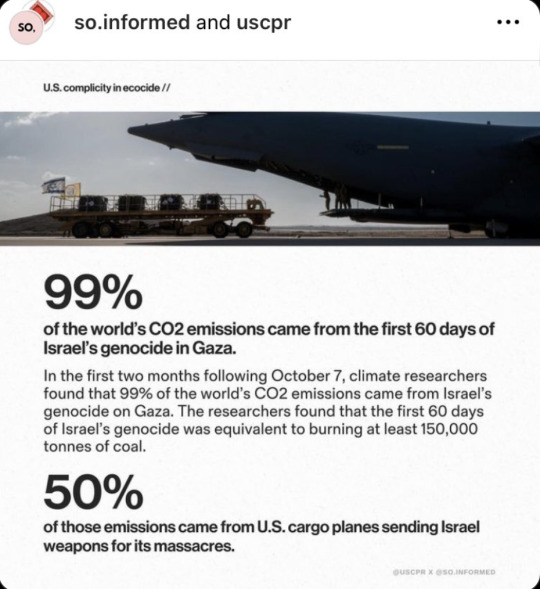
Israel has emmited 281,000 metric tons of carbon dioxide equivalent within the first 2 months of the war. Globally each year, over 35 billion metric tons of carbon dioxide and carbon dioxide equivalent gets emitted. Assuming they meant within 2 months as well and not a whole year, taking the 2019 figure of
37.04 billion metric tons, two months of global emissons are 6.173 billion tons.
Israel hasn't even reached the billions. Israel's emissions from the first two months of war is 0.0045 of global emissions within 2 months.
Its not even one percent.
218 notes
·
View notes
Text
Because the olive tree has long been symbolic of the Indigenous Palestinian presence, the JNF plants mostly pine trees, which do not carry a Palestinian political meaning. Hundreds of thousands of pine trees were planted in the desert, where only a few thorny bushes had earlier grown, necessitating the diversion of water from its natural paths to irrigate them. Pine seeds are easily dispersed, by wind or fire, and saplings grew in open areas, where they took over the previously barren space. Trees are nature’s “green lung,” generating oxygen and filtering pollutants. However, following massive and deadly wildfires in northern Israel, environmental studies have shown that the Zionist afforestation project contributed to environmental devastation. Ecologists today are recommending that Israelis plant fewer trees and limit themselves to replanting with native trees. This is because the new Israeli forests were causing more warming than cooling, as their dense tree canopies absorb solar radiation, whereas the lighter colors of the native desert plants had once reflected the sun’s heat away from the soil.
[...]
An Indigenous people attuned to the land would have tended it more carefully, seeking to preserve rather than transform it. Instead, the JNF’s determination to “make the desert bloom” has been detrimental to Palestine’s very nature, and its soil, which once sustained the people. Where once there was sustainable biodiversity, Israel supplanted a monoculture of pine trees. The very geography of Palestine today shows the ugly face of apartheid: recently planted “forests” within the 1948 borders, irrigated by water from diverted aquifers under parched Palestinian fields, and strips of bare land heavily sprayed with herbicides surrounding the majority-Palestinian areas.
Nada Elia, Greater Than the Sum of Our Parts: Feminism, Inter/nationalism, and Palestine
304 notes
·
View notes
Text
The climate crisis is often framed as primarily a problem caused by fossil fuels, and they do play an important role in heating the planet. But even if we could magically reduce fossil fuel emissions to zero tomorrow, according to data scientist and Oxford researcher Hannah Ritchie, our current food systems mean we’d still blow “well past the 1.5 degrees carbon budget, and use up nearly all of our two degrees budget”. What that ought to tell us, she added, “is that we just cannot tackle climate change without also tackling food systems”.
And beef, of which JBS is the largest producer in the world, far outpaces not only plant-based food, but other animal sources of nutrition as well, when it comes to climate impacts. Cows belch methane, and they’re largely fed grains that are grown in fertilizer-intensive monocultures where excess fertilizer causes water pollution or turns into nitrous oxide, another potent greenhouse gas, said Lehner. And that’s not even taking into account the slashing and burning of the Amazon to make room for more cattle, which JBS has been linked to many times over.
“If JBS loses – and they’re going to – I think it’s already sending a signal to major companies that you cannot just say ‘We’re Paris [agreement]-aligned.’ You cannot just say ‘We’re going to be net zero in 2030’ when you have no plan, and the curve for your climate pollution is going straight up,” said Paglia. “You cannot keep lying like this.”
86 notes
·
View notes
Link
Article Date: 7 June 2023
Climate litigation in the US could be entering a “game changing” new phase, experts believe, with a spate of lawsuits around the country set to advance after a recent supreme court decision, and with legal teams preparing for a trailblazing trial in a youth-led court case beginning next week.
The first constitutional climate lawsuit in the US goes to trial on Monday next week (12 June) in Helena, Montana, based on a legal challenge by 16 young plaintiffs, ranging in age from five to 22, against the state’s pro-fossil fuel policies.
A federal judge ruled last week that a federal constitutional climate lawsuit, also brought by youth, can go to trial.
More than two dozen US cities and states are suing big oil alleging the fossil fuel industry knew for decades about the dangers of burning coal, oil and gas, and actively hid that information from consumers and investors.
The supreme court cleared the way for these cases to advance with rulings in April and May that denied oil companies’ bids to move the venue of such lawsuits from state courts to federal courts.
Hoboken, New Jersey, last month added racketeering charges against oil majors to its 2020 climate lawsuit, becoming the first case to employ the approach in a state court and following a federal lawsuit filed by Puerto Rico last November.
the new forms of climate litigation are different, as they grapple not with particular projects’ emissions, but on responsibility for the climate crisis itself. Sokol, who dubbed these new suits “climate accountability litigation”, says though they will not alone lower emissions, they could help reshape climate plans.
In the US, this litigation has taken a variety of forms; perhaps the best known cases are based on constitutional rights and brought by youth.
One of those cases, Held v Montana, is based on the state’s constitutional guarantees to a clean and healthy environment, which were enshrined in the 1970s and which the plaintiffs say the state has violated by supporting fossil fuels. It will next week become the first-ever constitutional climate lawsuit to go to trial in the US.
Held v Montana followed the highly publicized 2015 Juliana v United States in which 21 young people from Oregon sued the US government for violating their constitutional rights to life, liberty and property by enacting policies that drove and exacerbated the climate crisis. The case, which like the Montana suit was filed by the non-profit law firm Our Children’s Trust, calls on federal officials to phase out fossil fuels.
Last week, a US district court ruled in favor of the youth plaintiffs, allowing that their claims can be decided at trial in open court.
Litigation based on state constitutional rights, also filed by Our Children’s Trust, is currently pending in four other states. One of those cases brought by Hawaii youth is set to go to trial, possibly as soon as this fall.
Another set of lawsuits in the US allege that the fossil fuel industry has for decades known about the dangers of burning coal, oil and gas, and actively hid that information from consumers and investors. Since 2017, seven states, 35 municipalities, the District of Columbia, and one industry trade association have sued major fossil fuel corporations and lobbying groups on these grounds.
In late April, lawyers for the city of Hoboken amended a 2020 complaint to allege that the defendants violated New Jersey’s racketeering laws by conspiring to sow doubt about climate change.
It marked the first-ever state-level lawsuit of its kind, following one last year in which 16 Puerto Rico cities brought federal racketeering charges, originally used to bring down criminal enterprises like the mafia, against big oil.
Unlike some previous cases, Hoboken’s amended lawsuit focuses not only on past misinformation, but also on contemporary greenwashing – something that could feature prominently in future cases.
A study last month examined litigation against fossil fuel majors and found that the filing of a new case or a court decision against a corporation took a slight toll on their finances. Novel developments – including a groundbreaking 2021 Netherlands court ruling ordering Shell to substantially slash its carbon emissions, and an unprecedented transnational claim filed in 2012 by a Peruvian farmer against a German energy company – yielded bigger blows.
Sankar, of Earthjustice, said he expects to see new forms of climate litigation in future years. “As the impact on states and localities increases, they are increasingly going to be looking for ways in which their state and local laws protect them,” he said.
(shinigami red links in this post go to The Guardian)
Article Date: 7 June 2023
Article Source: Dharna Noor for The Guardian
--
Thanks so much to @queerce for submitting!
#queerce#climate justice#greenwashing#climate litigation#lawsuits#hoboken#new jersey#puerto rico#united states#netherlands#peru#germany#earthjustice#racketeering#climate change#oregon#montana#constitutional law#supreme court#scotus#good news#hope
263 notes
·
View notes
Text

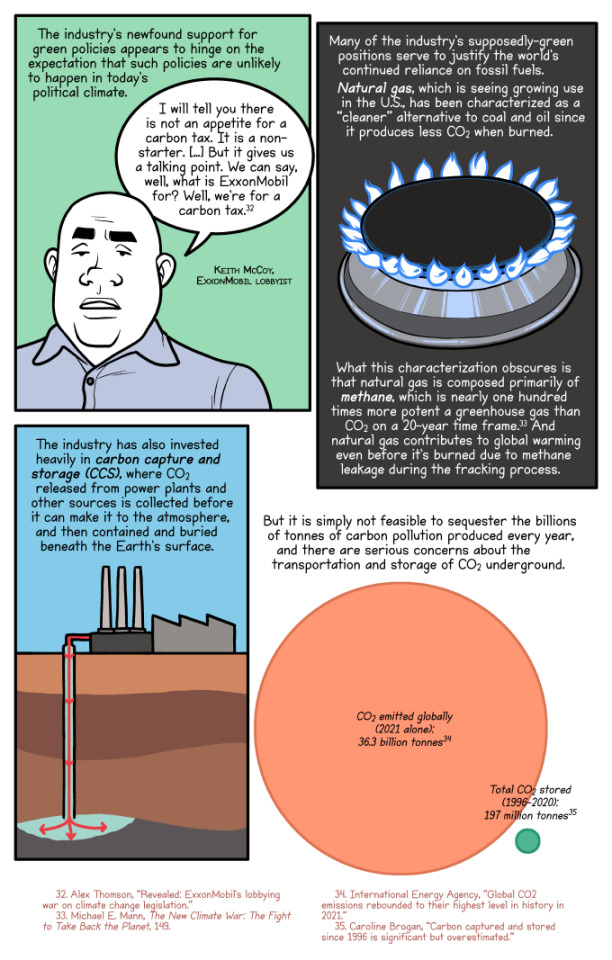


Excerpt from "Why the Planet Burns" on Comics Chronicle.
132 notes
·
View notes
Text
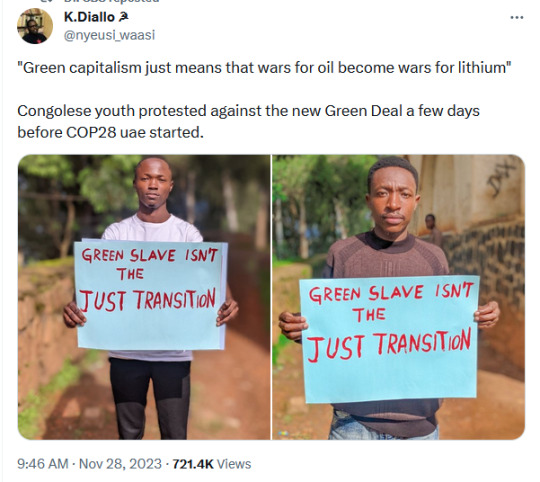
122 notes
·
View notes
Text
A non-profit organization in B.C. says it has asked Canada’s Competition Bureau to investigate athletic-wear giant lululemon, arguing the company is misleading customers about its environmental impacts.
A statement from Stand.earth says lululemon has been using the slogan “Be Planet” as part of its “impact agenda” released in 2020, but the company’s own reports reveal a doubling of greenhouse-gas emissions since then.
lululemon’s 2022 impact report says its “products and actions help lead (the) industry toward a climate-stable future where nature and people thrive.” It also says the Vancouver-based company aims to meet a series of climate action targets by 2030, including a 60-per-cent reduction in emissions intensity for “Scope 3” operations, which encompasses the making and shipping of clothing globally.
Continue Reading
Tagging @politicsofcanada
#cdnpoli#canada#canadian politics#canadian news#lululemon#greenwashing#climate change#carbon emissions
61 notes
·
View notes
Text
Excerpts from the article below. It's from 2019 but many of its points are still relevant and crucial:
Make no mistake: Israel is using veganism as a calculated facade to justify its military’s program of terror, gloss over its occupation of Palestine, and appropriate regional culture and traditions that predate Israel by hundreds if not thousands of years.
Far from being a politically neutral “lifestyle,” true veganism is a radical anti-oppression philosophy, and yet one of the most oppressive governments in the world is co-opting veganism for its own gains.
Ahmad Safi, the Executive Director of the Palestinian Animal League, perhaps best encapsulates the IDF’s breathtaking hypocrisy around veganism in his piece “On the ‘IDF’s vegan warriors’: A vegan Palestinian’s perspective.” In describing a BBC special on the “vegan warriors” of the IDF, Safi notes, “I was somewhat baffled by a particular passage in the article, taken from a radio interview which said of one of the vegan soldiers: ‘Her diet is so important to her that had the army not been able to provide conditions that had harmed no living creatures, she might not have enlisted in a combat unit.’ The only way in which I can interpret this is that the soldier in question does not consider Palestinians to be ‘living creatures.’”
An explicitly intersectional, anti-capitalist vegan movement could never provide a coherent justification for human rights abuses, even on a superficial level. In our desire to make veganism more appealing to the masses, however, vegans have sold our politics out. And the wrong people bought them, along with the IDF’s favorite hummus.
Though we are up against powerful industrial and military systems, we can still move towards justice. Rejecting a consumerist vision of veganism, learning about Palestinian cuisine and culture, and joining the Palestinian civil society movement of BDS (Boycott, Divestment, Sanctions) are just a few actions that we can take.
107 notes
·
View notes
Text



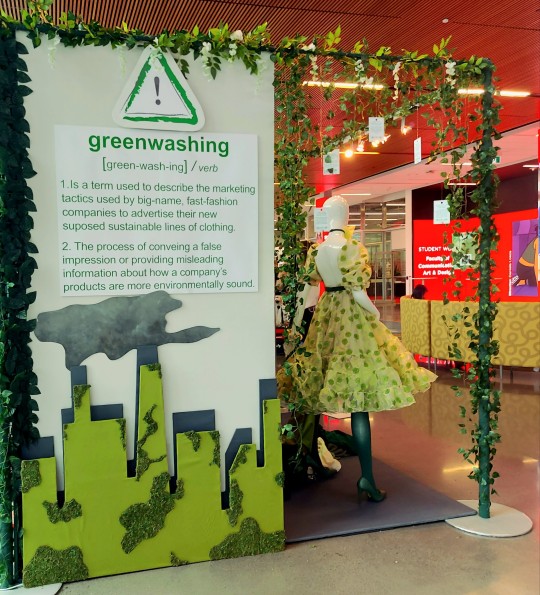
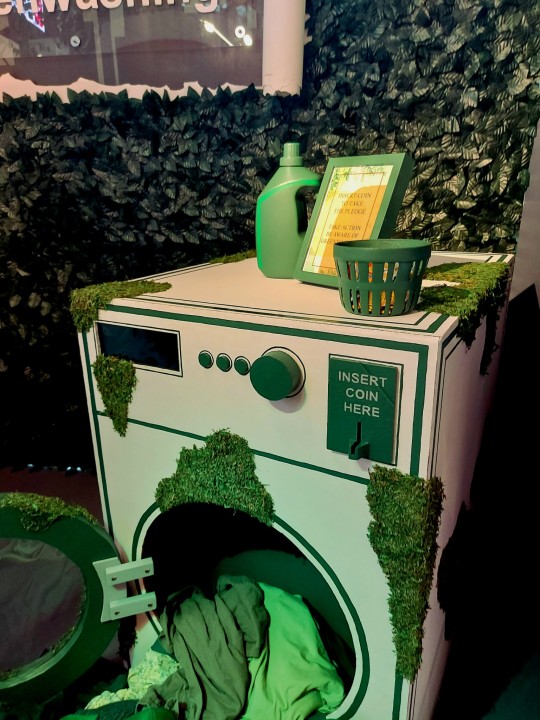
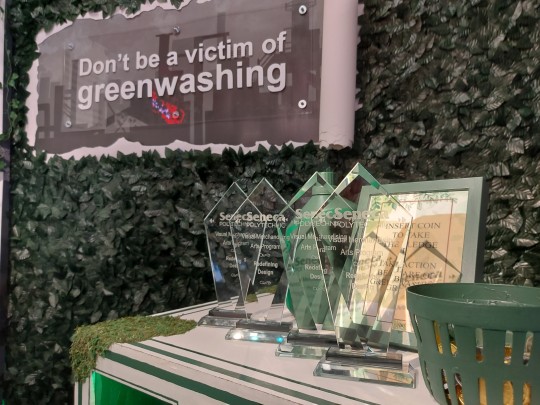
🏆 Redefining Design 2024 at Seneca Polytechnic
We won first place in the Visual Merchandising Art competition!
A huge shoutout to my incredible team for making this possible:
🌟 @ itzel.maldonado.quiroz (Instagram)
🌟 @ portfolioby_nat (Instagram)
🌟 @ flirtingwithfashion_ (Instagram)
Thank you to Fashion Takes Action (FTA) for sponsoring our booth! 🌍✨
#toonspartyroom#redefiningdesign2024#Seneca fashion#fashion#greenwashing#styling#visual merchandising
28 notes
·
View notes
Text
32 notes
·
View notes
Text
Letitia James’s lawsuit accuses JBS of deceiving customers about being climate-friendly – and the implications could be far-reaching
#letitia james#jbs#deforestation#amazon rainforest#cattle ranching#false advertising#greenwashing#climate crisis#climate emergency#climate change
27 notes
·
View notes
Text
This hierarchical categorization of the land, where the desert is perceived as inferior to (superior) cultivated/green land, is informed by the Zionist discourse, which portrays the creation of Israel on the ruins of hundreds of destroyed Palestinian villages as redeeming the land. Such discourse seeks to legitimize and moralize Israel’s actions: it depicts Israel as a moral and progressive steward of land efficiency, rather than an immoral settler-colonial and apartheid regime.
See also: Myth: Israel made the desert bloom by Decolonize Palestine
302 notes
·
View notes
Text
New York Attorney General Letitia James today filed a lawsuit against JBS USA Food Company and JBS USA Food Company Holdings (JBS USA), the American subsidiary of the world’s largest producer of beef products, for misleading the public about its environmental impact.
JBS USA has claimed that it will achieve net zero greenhouse gas emissions by 2040, despite documented plans to increase production, and therefore increase its carbon footprint.
Beef production emits the most greenhouse gasses of any major food commodity, and animal agriculture accounts for 14.5 percent of annual global greenhouse gas emissions. In 2021, the JBS Group, JBS USA’s global parent company, reported total global greenhouse gas emissions of over 71 million tons, more than the total emissions of some countries.
Attorney General James seeks to stop JBS USA from continuing these false and misleading marketing practices, pay disgorgement of all ill-gotten profits, and penalties.
37 notes
·
View notes
Text
youtube
Does planting trees actually cool the planet? - Lesson by Carolyn Beans, directed by Ivana Bošnjak, Thomas Johnson Volda.
#video#ted ed#animation#ivana bošnjak#ivana bosnjak#thomas johnson volda#trees#carolyn beans#alexandra panzer#gerta xhelo#stephen larosa#sazia afrin#alex rosenthal#shannon odell#charles wallace#carbon offset#greenwashing#reforestation#afforestation#Youtube
23 notes
·
View notes